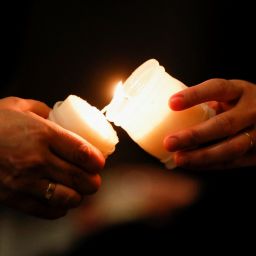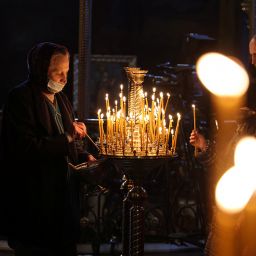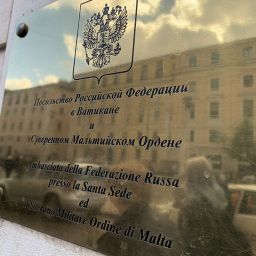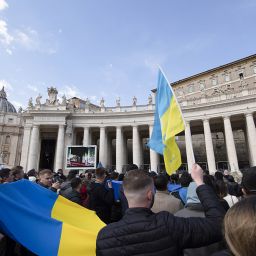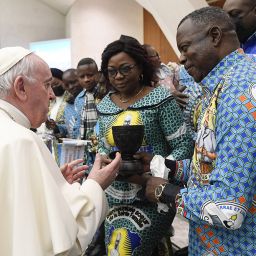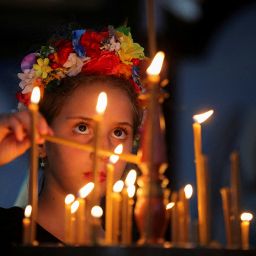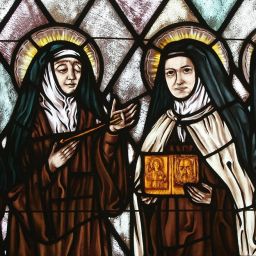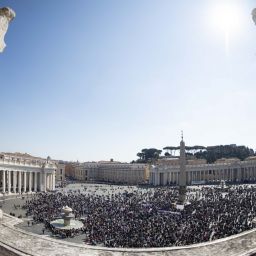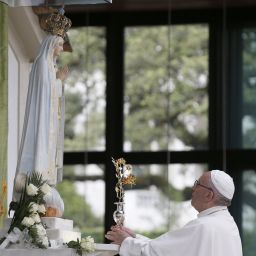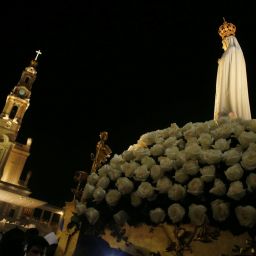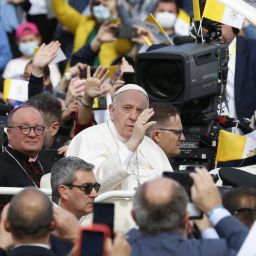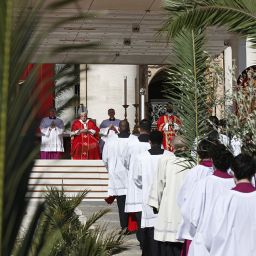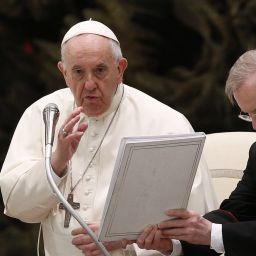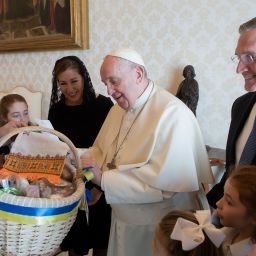
By Cindy Wooden
Catholic News Service
VATICAN CITY — Away in a cave near Greccio, Italy, St. Francis of Assisi had the first Nativity scene — a live one — staged for the faithful on Christmas Eve in 1223. A 15th-century fresco now decorating the cave inspired the Nativity scene erected in St. Peter’s Square for the 800th anniversary celebrations.
Before the scene was unveiled and the Christmas tree in the square was lighted Dec. 9, Pope Francis met with the more than 100 people involved in erecting the creche, officials from the Rieti Valley, which includes Greccio, and from the little town of Macra, in northern Italy, which donated the silver fir tree.
For St. Francis of Assisi, who had traveled to the Holy Land, “the caves of Greccio reminded him of the landscape of Bethlehem,” the pope said. The saint asked that a donkey and an ox, some hay and a manger be brought to the cave on Christmas Eve and invited other friars and people from the village, “creating a living Nativity scene. Thus, the tradition of the Nativity scene as we understand it was born.”
Remembering Greccio today, the pope said, people should also think of Bethlehem. “And as we contemplate Jesus — God made man, small, poor, defenseless — we cannot but think of the tragedy that the inhabitants of the Holy Land are living, expressing to those brothers and sisters of ours, especially the children and their parents, our closeness and our spiritual support. They are the ones who pay the true price of war.”
Whether the Nativity scene is in St. Peter’s Square, in a church or in one’s home, the pope said, people passing one should remember Jesus’ birth 2,000 years ago and be moved to “silence and prayer in our often so hectic daily lives.”
“Silence to be able to listen to what Jesus tells us from the unique ‘cathedra’ of the manger,” he said. “Prayer to express grateful wonder, tenderness and perhaps the tears that the Nativity scene stirs in us.”
Enrico Bressan, co-curator of the Nativity scene in the square, told reporters that when he and Giovanna Zabotti were asked two years ago to create the Vatican creche for the anniversary, “We felt like Giovanni Velita and his wife, Alticama,” who helped St. Francis of Assisi stage that first scene.
Pope Francis, who usually visits the scene after vespers Dec. 31, stopped by Nov. 29 to see the work in progress and bless the workers, Bressan said. “It was a great joy for us and gave us strength.”
Among the 103 people who worked on the scene, he said, one of the first was Francesco Artese, a master creche maker, who used the fresco now in the cave to design the scene. Antonio Cantone, who has been making Nativity scene figures in Naples for more than four decades, created the life-sized figures of the Holy Family, St. Francis of Assisi, other friars and the Velita couple. Set and lighting designers from Cinecittà, the famed Rome movie studio, created the cave and the lighting.
Cantone also created the figures for Nativity scenes in the square in 2013 and 2017. But those had the facial features and clothes of Neapolitans in the 1700s, which is now the standard for Italian Nativity scenes. However, this year’s figures resemble how people would have looked and dressed in central Italy in the 1200s, he said.
“For an artist who lives making Nativity scenes year-round,” he said, being part of the 800th anniversary celebration “is like winning an Oscar for the years of sacrifice and the creches of the past.”
The figures include a Franciscan priest celebrating Mass, just as one of St. Francis’ confreres did in the cave on Christmas Eve in 1223.
Cardinal Fernando Vérgez Alzaga, head of the office governing Vatican City State, told those gathered in the square in the evening for the unveiling that the representation of the Mass at the manger “emphasizes how the incarnation of the son of God has remained among us through his body and blood in the Eucharist.”
Zabotti said that for her, Nativity scenes were always part of a family celebration of Christmas, but the two-year project for St. Peter’s Square made her realize how St. Francis was trying to tell the simple people of Greccio that “whenever in the world people gather on that night in Jesus’ name, there is the Incarnation.”
“Whenever someone sets up a Nativity scene,” she said, “there is not just Mary, Joseph and the baby Jesus. We are there. The people of today. We are the shepherds now.”

